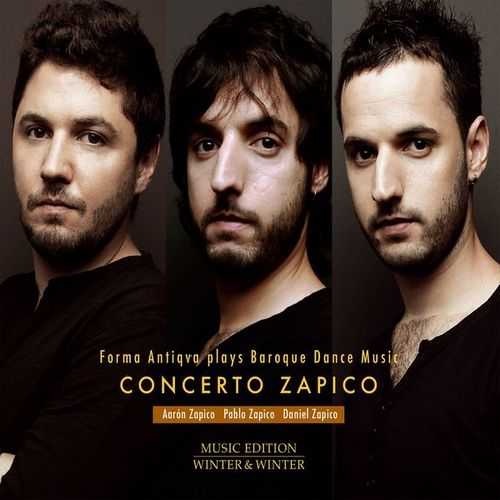
Performer: Forma Antiqva
Audio CD
Number of Discs: 1
Format: FLAC (tracks)
Label: Winter and Winter
Size: 536 MB
Recovery: +3%
Scan: cover
01. Scarlatti, D: Fandango
02. Roncalli: Preludio
03. Kapsberger: Passacaglia
04. anon.: Bayle del Gran Duque
05. Murcia: Fandango
Kapsberger:
06. Toccata XI
07. Capona & Ciaccona
08. Jusepe Ximénez: Obra De Lleno De Primer Tono Sin Paso
Murcia, Corelli:
09. Preludio Grabe
10. Giga
11. Pasquini: Partite diversi di follia
12. Murcia: Folías Gallegas
13. Nebra: Fandango
14. Kapsberger: Colascione
15. Ortiz, Valente: Recercada I / Lo Ballo Dell ‘Intorcia
Forma Antiqva:
Aarón Zapico (harpsichord, organ),
Pablo Zapico (baroque guitar),
Daniel Zapico (theorbo)
Recorded: June 2010
Recording Venue: Sala de Cambra, Fundacio Auditori Palau de Congressos, Girona, Spain
Three brothers named Zapico — Aarón, Pablo, and Daniel — are part of the early music group Forma Antiqua (or, Antiqva); they appear here by themselves in a program of “Iberian-Italian” Baroque dance music, a genre whose influence stretched as far north as mid-Germany. The listener who samples this disc and wonders whether Baroque keyboard pieces ever actually had this much oomph can be assured that the recording falls purely into the not-even-speculative realm of using musical scores purely as a stimulus for further creative activity; keyboard music was something of a realm unto itself in the 17th century, and the booming guitar-and-theorbo arrangements heard here are purely the invention of the players. Indeed, they offer no justification other than that of wanting to play the music together. This said, the disc has the considerable virtue of reminding the listener that all of the patterns — the fandangos, ciaccona, giga, folía, and so on heard here — that made their way into Baroque music as ground basses were originally dances. The accompaniments devised by the Zapicos perhaps go beyond the intensity Baroque audiences would have recognized as appropriate (or perhaps they don’t). But they’re a great deal of fun, and they go together with the exciting group of releases that’s defining the secular repertory exemplified by such composers as Santiago de Murcia, a repertory whose echoes have come down to the present day in both old and new worlds. Not “authentic,” but if you don’t tap your feet to a piece like Murcia’s Folías gallegas (track 12), you’d better check for a pulse.